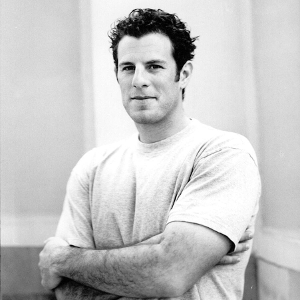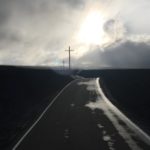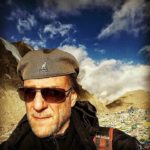Doug Lansky grew up in Minnesota and graduated from Colorado College. After interning at “Late Night with David Letterman,” “Spy Magazine,” and “The New Yorker Magazine,” Lansky, hit the road in 1992. He has been traveling the world ever since, chronicling his adventures in his nationally syndicated humor column, “Vagabond.” People can find the archive online at Gorp.com or listen to his radio reports at Savvytraveler.com (or on the air monthly, check local listings for times).
Lansky is the author of the books “Last Trout in Venice” and “Up The Amazon Without a Paddle.” He is also editor of a travel-humor anthology called, “There’s No Toilet Paper on the Road Less Traveled.”
How did you get started traveling?
At the risk of sounding like some bad college application essay, I got the travel bug while Eurailing the summer after my junior year abroad. I wandered down to Morocco for two weeks and found a job selling carpets. That gave me a great taste for traveling in developing countries, an idea of the sort of experiences that awaited, and the confidence to pursue them. (Told you it was going to sound like a bad application essay.)
How did you get started writing?
I got started way back in 9th grade, at the same time I was trying to part my hair down the middle and desperately (albeit unsuccessfully) “feather” it with a comb and tuck in my pant cuffs, as was the style of the day, so tight they nearly cut off the circulation to my feet. I started a humor column in the school newspaper, “The Typo.” Actually, it was called “Breezes,” but this was in the era before the automated spell checker, and we often didn’t feel like re-reading the material until after it had been published. For four years I wrote a humor column in my college newspaper, The Compost Heap, and worked summer internships at “Late Night with David Letterman” (where I was in charge of screening unsolicited tapes of “stupid human tricks”) and “Spy Magazine” (where the extent of my investigative reporting consisted of getting my crew cut re-coiffed at five prestigious salons the same day and taking before and after photographs). Never quite made it to journalism school.
What do you consider your big “break” as a travel writer?
The big one came in the summer of 1995 while I was living in Santiago de Compostela, Spain after about 9 months of trying to break into newspaper travel sections. I got an email from United Features Syndicate saying they’d like to syndicate my humor-adventure column, “Vagabond.” I went out with some friends to celebrate and we totally assaulted our livers with red wine. Then the very next day, I got an email from the Chicago Tribune syndicate with the same offer. We had to go out and repeat the previous night’s performance. Three months and minimal bidding later Vagabond was launched — I signed up with the Chicago Tribune for a 5-year stint to circle the globe and send in weekly dispatches. Smaller breaks before that came from individual travel editors at newspapers: Ken Doctor, Janet Fullwood, Alison Darosa, Jack Severson, Bob Jenkins, Jay Clarke, Sue Hobart, Jim Molnar — kind souls who plucked me from the depths of the slush pile.
As a traveler and fact/story-gatherer, what is your biggest challenge on the road?
At the beginning, it was just sending in my dispatches. The Web was just getting started and there weren’t yet Internet-connected computers in every third-world youth hostel, so I had to carry this thing around called The Telephone Coupler, which looked like a phone handset, and attach it to another handset, 69-style, with a Velcro strap. It looked like bondage phone sex. The problem was, a lot of people had never seen a computer before, never mind The Telephone Coupler, and they weren’t exactly excited about the idea of me hooking it to their phone. I had to beg (and pay) people for telephone usage and I had to count on at least a half day to just send in a finished story. Plenty of other challenges — finding good books to read in far-flung places (I got stuck swapping for Danielle Steele novels more than once), staying amoeba-free, trying to keep from burning out during one- or two-day-per-town trips. I find that after two months of quick stepping it, I need to stop for a few weeks and recharge the wanderlust.
What is your biggest challenge in the writing process?
At the beginning it was the humor, which gets a bit tricky when you’re writing about other cultures. It’s a lot more touchy than making fun of things domestically. If you see some tribesman in Africa with a totally ridiculous hat, it doesn’t work to write that he has a totally ridiculous hat, or it makes him look like a human pasta strainer. Instead, you need to filter it through your own narrative with a dose of self deprecation and say something like, “the tribesman could pull it off, but if that hat was sitting on my head I’d look like a human pasta strainer.” Of course, it’s not always that simple. Later — and I think this applies mostly to columns — I had to push myself to keep from falling into the formula that I had created. However, that formula might also be called your “groove” or “niche” or “style” and it’s what many readers are eager to get when they see your byline. But trying to find some new approach within the framework of the column was something that continually kept me on my toes.
What is your biggest challenge from a business standpoint? Editors? Finanaces? Promotion?
Trying to maintain your integrity can be a challenge. With cool editors you see completely eye to eye with, it’s never an issue. But I’ve had a major magazine editor (not going to name names) ask me to flat out lie in my story (I refused and was blacklisted from the magazine). Others have pushed (or simply added) a more seedy angle than I felt like providing. (One editor wrote a headline to the effect of “Iceland Sucks” on my story about Iceland. I had hate mail coming in for months — and the people who wrote me obviously never even read the story.) Frequently, an editor will cut a giant chunk of your story — so much so that the ending no longer makes sense — to make room for an “If You Go” listing of restaurants and hotels. (The thing I never understood about this is why they sacrifice the story to provide info that maybe .00001 percent of the readers will ever use.) It’s not always easy to take a stand. They don’t think they’re doing anything wrong (and maybe they’re not), but you’ll just piss them off by pointing it out. And if you don’t point it out, you feel like you’re swallowing your pride and integrity on a regular basis.
Survival is also a challenge. With syndication, they never tell you where to go or what to write, but they also don’t cover your expenses. And you only make 50% of what newspapers pay for the column. And if you have 17 newspapers paying discounted rates, as I did when I started, you’re looking at a salary about on par, or maybe even lower, with a condiment refiller at Arby’s. So I had to spend my time traveling in places like India and Bolivia where you can actually live on such a salary. It felt weird being this nationally syndicated columnist and being totally broke. The last two years of the contract, I could cover the travel expenses, but not much more. I liked to put a more positive spin on it, though: I was traveling the world for free.
Do you do other work to make ends meet?
After my post-grad two-year trip around the world, I returned home but was still hooked on travel. And after months of staring at my $3 fake “freelance journalist” ID card purchased in Bangkok, the fantasy was sounding pretty good. At the beginning, travel editors kept saying, “I might be able to run a piece now and then, but don’t give up your day job.” Problem was I didn’t even have a day job. So I found one. I saw a cardboard chair in a modern art gift shop and thought it would be perfect for eco-minded college students on a tight budget. So I called up the owner and got hired as a sales rep. I spent two days a week driving around to colleges and furniture shops with a bunch of cardboard chairs in the back of my rusted out Mazda. Just as I was starting to do well with some big accounts, the cardboard furniture company collapsed (no pun intended).
Other than that, I’ve only taken on projects I thought were interesting. There’s no money to be made in doing Public Radio pieces. I also edited a humor anthology, gathered my columns into a book, and did a few magazine pieces. This opened other doors, like the chance to return to my alma mater as a journalism professor, which was great. (No, I didn’t let anyone call me professor.) And I got the chance to work as a host for a Discovery Channel/Travel Channel show called Trailblazers. It was similar to the Lonely Planet series you’re probably more familiar with. [Note to readers: it may seem like I’m getting off the subject — and I am — but Rolf wanted me to write about this.] The 25 days I spent traveling Japan with a film crew was pretty interesting and often fun, but it didn’t feel anything like what I knew as travel. By that, I mean I was not involved in the day-to-day planning of where we would go, what we would do, or how we’d get around. Plus, we had nice hotels; I never paid for a meal; I didn’t even have to handle money. Also, there was a surprising amount of acting involved for a documentary — as I’m sure there is with all such shows, Lonely Planet and Michael Palin included. For instance, the film crew (five people) set up a big camera on a tripod in an outdoor market, and with a crowd gathered to watch (suddenly, you’re the tourist attraction), the director tells you to casually go up and buy an apple from some vendor. So I do, and it goes fine, considering I don’t speak Japanese. Then they’ll tell you the audio wasn’t quite right, or such and such battery died, or the lighting was wrong, and you end up going up and pretending to buy an apple about 8 times and the vendor thinks you’re a total moron and you feel like one as well. The other part that was rather tricky was being “on” all the time. It’s like you’re hosting a party, only the guests never leave. You have to be “on” from 7 a.m. to midnight for 25 straight days. If you’re not used to this, and I wasn’t, at the end of the day you’re totally spent.
What travel authors or books might you recommend and/or have influenced you?
I don’t read all that many travel books. No, that’s not true. But I don’t seek them out in my free time. I find the pace a bit slow. Many travel writers like to tell you every little thing they do (please pardon the ensuing cynicism) — like just because they’re out of the country, we’re supposed to give a shit about every step they take or souvenir they buy. If you haven’t traveled much, this might be fascinating stuff, but if you’re living on the road and experiencing those things yourself everyday, it can get painfully boring. This doesn’t mean they aren’t extremely talented writers — so many are outstanding wordsmiths and I have much to learn from them. Having said that, I would recommend “Iron and Silk” by Mark Salzman or Nigel Barley’s “Ceremony”. I like that they offer entertaining insights well beyond what you can find as a traveler, and they confine the storytelling to the highlights. In terms of writing style, P.J. O’Rourke, Dave Barry, and Bill Bryson are my biggest influences.
What advice and/or warnings would you give to someone who is considering going into travel writing?
Write everyday. Work on polishing your stories. College gets you in a bad habit of doing a paper at 2 a.m. and turning it in at your 9 a.m. class. Give the piece to someone to read, make some changes, then give it to someone else. When getting started, you should do about two more rounds of edits than you think you need. You also need to find the balance between being thick-skinned when taking criticism and sticking with your instincts to develop your own style. Read the publications you’re submitting to, start by pitching small stories, make a lot of submissions, don’t be put off by rejection, and don’t follow up more than once every two or three weeks. Oh, and make sure you have a heap of money in the bank to live off of while you’re doing this.
What is the biggest reward of life as a travel writer?
Da lifestyle! Going where you want, doing spectacularly fun, new and exciting stuff on a daily basis. It’s also nice to get positive feedback from readers, and I’ve been fortunate in that respect. (douglansky@aol.com) I always do my best to respond.





